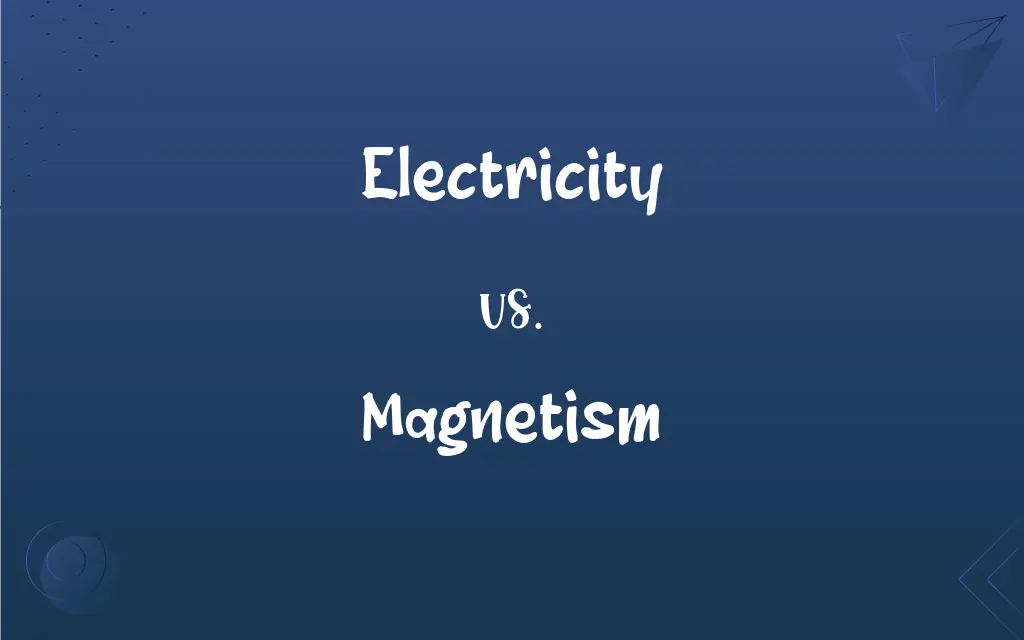Electricity vs. Magnetism: What's the Difference?
Edited by Aimie Carlson || By Harlon Moss || Updated on October 17, 2023
Electricity pertains to the movement of charged particles, often electrons, creating current. Magnetism involves forces and fields due to magnetic poles.

Key Differences
Electricity is a fundamental force of nature that describes the movement of charged particles, primarily electrons, through a conductor. It results in current which can be harnessed to do work, such as powering machines or lighting up bulbs. This flow of electrons from one place to another underlies many of the technological advancements we see in the modern world.
Magnetism, on the other hand, is the phenomenon by which materials exert an attractive or repulsive force on other materials. Some materials, like iron and nickel, are naturally magnetic. Magnetism operates through fields which can attract or repel without direct contact. Magnets have north and south poles, and like poles repel while opposite poles attract.
Electricity and magnetism are intrinsically linked, forming the foundation of electromagnetism. When electric current flows, it can produce a magnetic field. Conversely, a changing magnetic field within a coil can produce an electric current. This interrelation is utilized in many devices, from electric motors to generators.
However, while they're intertwined, electricity and magnetism operate on distinct principles. Electrical phenomena arise from the existence of electric charges and their movement, whereas magnetism deals with the interaction and alignment of certain metallic molecules or intrinsic spin of subatomic particles.
Interestingly, our understanding of electricity and magnetism underwent a revolutionary change in the late 19th and early 20th centuries. Scientists like James Clerk Maxwell formulated equations that unified the two, leading to groundbreaking technologies and furthering our understanding of the universe.
ADVERTISEMENT
Comparison Chart
Fundamental Principle
Movement of charged particles
Forces due to magnetic poles
Natural Phenomenon
Lightning
Earth's magnetic field
Resulting Field
Electric field
Magnetic field
Units
Volts, Amperes, Ohms
Tesla, Gauss
Applications
Powering devices, circuits
Compass navigation, magnetic storage
ADVERTISEMENT
Electricity and Magnetism Definitions
Electricity
The set of physical phenomena associated with charged particles.
Electricity powers our homes and devices.
Magnetism
A physical phenomenon produced by moving electric charge.
Magnetism can be generated by flowing electricity through a coil.
Electricity
The flow of electrons from one place to another.
When you plug in a device, electricity flows to make it work.
Magnetism
The property of being magnetized or affected by a magnet.
Iron has a strong magnetism and can be easily magnetized.
Electricity
The science of electric charges and currents.
He studied electricity and made many inventions.
Magnetism
The force by which materials attract or repel each other.
Magnetism keeps the fridge magnet attached to the door.
Electricity
A secondary energy source generated from other primary sources.
We use dams to harness hydroelectric electricity.
Magnetism
The study of magnets and their properties.
He was fascinated by magnetism and its mysterious forces.
Electricity
A form of energy resulting from charged particles.
Static electricity causes a shock when you touch a metal doorknob.
Magnetism
A field of force surrounding magnets or electric currents.
The magnetism of a bar magnet can be visualized using iron filings.
Electricity
The physical phenomena arising from the behavior of electrons and protons that is caused by the attraction of particles with opposite charges and the repulsion of particles with the same charge.
Magnetism
The class of phenomena exhibited by a magnetic field.
Electricity
The physical science of such phenomena.
Magnetism
The study of magnets and their effects.
FAQs
How is magnetism created in materials?
Magnetism arises from the alignment of atoms or the spin of electrons within a material.
Can electricity produce magnetism?
Yes, a flowing electric current creates a magnetic field around it.
What causes static electricity?
It's caused by an imbalance of electric charges on a surface.
Why are some materials naturally magnetic?
Their atomic structure allows certain electrons to align, producing magnetism.
Are all metals magnetic?
No, only certain metals like iron, cobalt, and nickel exhibit strong magnetism.
What happens when like magnetic poles come close?
Like magnetic poles repel each other.
What is the primary source of electricity?
Electricity can be derived from various sources like coal, solar, wind, and nuclear energy.
How do compasses work?
Compasses work based on Earth's magnetism, with the needle aligning to the magnetic field.
How do magnets store information on hard drives?
Bits of data are represented by magnetic polarities on the drive's spinning disk.
How is electricity measured?
It's measured in terms of voltage, current, and resistance.
What's the danger of high voltage electricity?
High voltage can cause severe electric shocks, burns, or electrocution.
What's the main use of electromagnets?
Electromagnets are used in various devices, from motors to cranes, due to their controllable magnetic strength.
What's the relationship between electricity and magnetism?
They are interrelated phenomena, collectively called electromagnetism.
What's the unit for electric current?
The unit for electric current is the ampere.
Why do some materials lose magnetism when heated?
Heat causes atomic vibrations that can disrupt the alignment of magnetic domains.
Can we see magnetic fields?
No, but their presence can be visualized using tools like iron filings.
Can magnetism produce electricity?
Yes, moving a magnet near a coil of wire can induce an electric current.
How is electricity transmitted over long distances?
Through power lines using high voltage to reduce energy loss.
How does Earth's magnetism affect us?
It influences navigation, protects us from solar radiation, and affects various electronic devices.
How do electric motors work?
They use the interplay between electricity and magnetism to produce rotational motion.
About Author
Written by
Harlon MossHarlon is a seasoned quality moderator and accomplished content writer for Difference Wiki. An alumnus of the prestigious University of California, he earned his degree in Computer Science. Leveraging his academic background, Harlon brings a meticulous and informed perspective to his work, ensuring content accuracy and excellence.
Edited by
Aimie CarlsonAimie Carlson, holding a master's degree in English literature, is a fervent English language enthusiast. She lends her writing talents to Difference Wiki, a prominent website that specializes in comparisons, offering readers insightful analyses that both captivate and inform.
































































